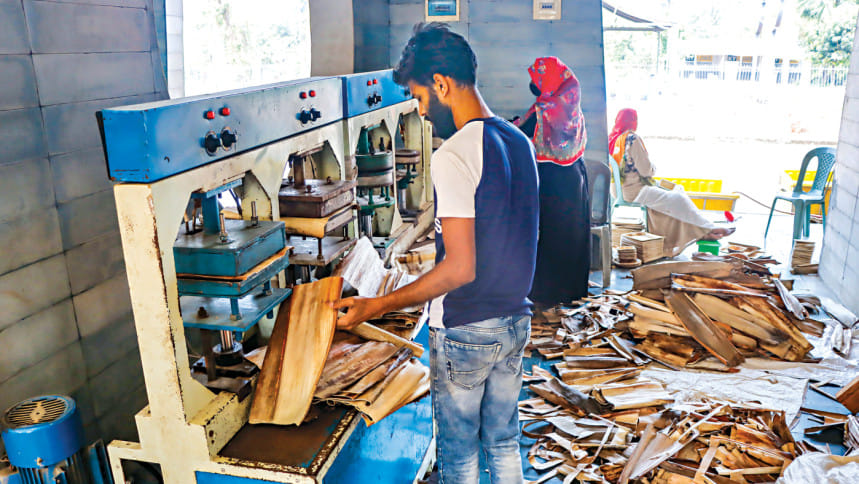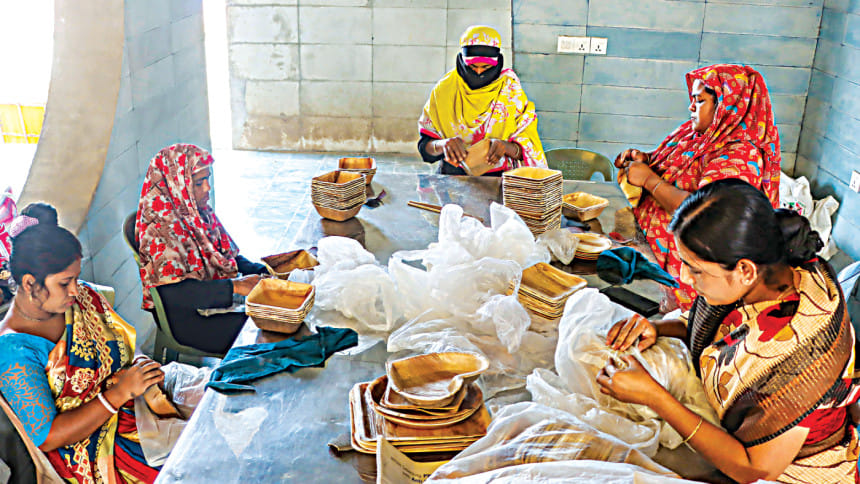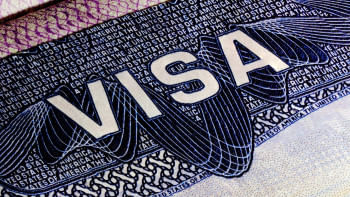VAT on plastics may double, eco-friendly products may get waiver

In a bid to discourage the use of plastic, the interim government may double the value-added tax (VAT) on some synthetic household products such as tableware and kitchenware to 15 percent.
Meanwhile, a 15 percent VAT on eco-friendly alternatives, such as plates and cutlery made of baked clay and plant-based materials like areca nut sheaths and those with biodegradable components, may be entirely waived, said sources.
The waiver is "to support green entrepreneurship as well as small and medium enterprises," said a finance ministry official, preferring anonymity.
Besides, the government plans to assign specific Harmonized System (HS) codes for raw materials used in the production of eco-friendly items—such as areca leaves, sal leaves, siali leaves, and palash leaves—to simplify their import process.
The HS codes are a globally recognised system of standardised names and numbers used to classify traded products.
"We are considering imposing only a 5 percent customs duty on these raw materials," said another official.

"The absence of dedicated HS codes currently results in them being classified alongside plastic items, attracting duties as high as 25 percent to 45 percent," added the official.
Finance Adviser Salehuddin Ahmed is likely to announce the proposals while placing the upcoming national budget for the fiscal year 2025-26.
"The global environment is being polluted through the use of plastic products. The level of pollution in Bangladesh is even more terrible," said the official.
Therefore, it is necessary to encourage the production of environmentally friendly alternative products to reduce dependence on single-use plastic products that pollute the environment, he said.
However, industry insiders fear that the move could hurt both manufacturers and consumers, given the widespread use and affordability of plastic goods in Bangladesh.
"This decision will significantly hurt the industry," said Shamim Ahmed, president of the Bangladesh Plastic Goods Manufacturers and Exporters Association.
"Plastic products are widely used by ordinary people. VAT hikes will raise prices, reduce sales, and affect livelihoods—especially those of small traders and street vendors," he said.
Annual domestic sales of plastic products amount to an estimated Tk 40,000 crore, with around 6,000 enterprises, which mostly run small and medium-sized operations, employing about 15 lakh people, according to Ahmed.
If the government mentions tableware and kitchenware, that means it will cover most of the plastic items, he said, urging the government to reconsider.
Despite these concerns, officials of the National Board of Revenue (NBR) argue that the time for tax benefits for the plastic sector has passed.
"These industries are now mature. Locally made plastic products are in almost every household. We must shift incentives toward more sustainable alternatives," an official familiar with the matter told The Daily Star.
In addition, the VAT on refrigerators and air conditioners (ACs) may be doubled to 15 percent in the upcoming budget.
Currently, the VAT at the local production stage of the two appliances is 7.5 percent, according to finance ministry sources.
Sources said up to fiscal year 2023-24, the VAT was 5 percent.
It was raised to 7.5 percent for the ongoing fiscal year 2024-25.

 For all latest news, follow The Daily Star's Google News channel.
For all latest news, follow The Daily Star's Google News channel. 



Comments